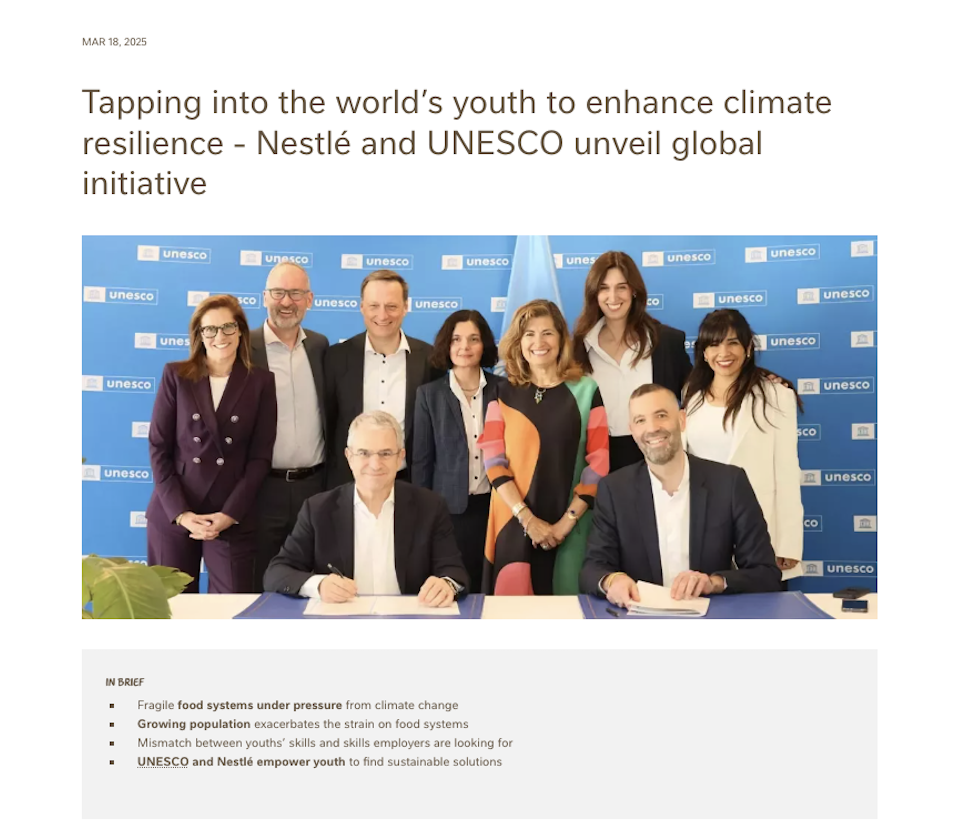
Over the past four decades, IBFAN has led the criticism of Nestlé’s marketing of commercial baby foods and has provided monitoring information to UN agencies and institutions, many of whom have ended collaborations with Nestlé.[ii]
Nestlé’s record on food safety, nutrition, plastic packaging, mono-cropping, deforestation, land-and-sea-grabbing, digital marketing and labour rights is especially problematic. 50-70% of its 2000 brand portfolio is deemed to be unhealthy and Nestlé shareholders refused a call to speed up change the marketing strategy at its 2024 Annual Assembly.[iv] Nestlé also refuses to abide by World Health Assembly Resolutions on infant feeding and its flooding of markets with ultra-processed snacks, drinks and foods, undermines confidence in breastfeeding and bio-diverse minimally processed family foods.[v]
The UNESCO education collaboration focuses on Environmental Sustainability and Climate Action and undermines the principle that education should be free from undue political and commercial influence. The ‘halo’ effect of these collaborations has clear financial value and works on many levels, building trust, distorting curricula and diverting attention from anti-social actions.[iii]
Nestlé is facing criminal proceedings about its bottle water business in France in November, with charges of illegal waste disposal and contamination linked to pollution by plastic bottles. This follows a 2 million Euro fine for illegal treatment of its bottled mineral water brands. The 3 billion Euro consumer fraud lasted over 15 years and Nestlé paid the fine to avoid legal action.[vi] IBFAN feared that the award event, planned for 18th September in Paris but called off, possibly because of transport strikes in France, could have been used to influence the criminal proceedings in this court hearing.[vii]
IBFAN will be meeting UNESCO to discuss these concerns in the near future.
Notes
UNESCO is the United Nations organization that promotes cooperation in education, science, culture and communication to foster peace worldwide.
[i] https://unesco.nestleyouthentrepreneurship.com. https://www.nestle.com/media/news/nestle-unesco-global-initiative An Award ceremony, that was due to take place in Paris today, 18th September has been called off, possibly because of strikes in France.
[ii]UNHCR uses ‘due diligence’ and abandons US$ 5 million deal with Nestlé https://www.babymilkaction.org/archives/19570
[iii] Nestlé has been running its Healthy Kids programs in schools since the early 1990s and has admitted that its key purpose is to ‘improve the company’s reputation’ and ‘legitimately communicate its socially responsible intentions to adults.’ Education materials are a more complex problem than straightforward product advertising because they blur the boundaries between advertising, marketing and independent information.
[iv] https://www.actiononsalt.org.uk/media/action-on-salt/WASSHShareAction-Summary-Report-(1).pdf
KitKat owner Nestlé fights off push to cut back on unhealthy products https://www.theguardian.com/business/2024/apr/18/nestle-vote-sugar-salt-fats “The coalition claimed Nestlé gets 75% of its global sales from products containing high levels of salt, sugar and fat…”. https://www.fooddive.com/news/nestle-investors-lessen-dependence-on-unhealthy-foods/710290/ Food Dive14 Mar 2024
[v] United Nations Children’s Fund (UNICEF), Feeding Profit. How food environments are failing children. Child Nutrition Report 2025, Report Brief, UNICEF, New York, September 2025. https://www.unicef.org/reports/feeding-profit
[vi] https://www.corpwatch.org/sites/default/files/Tangled%20Up%20In%20Blue.pdf
[vii] https://www.foodbev.com/news/nestl%C3%A9-watergate-french-mineral-water-brands-face-trials-over-illegal-treatments-and-microplastic

